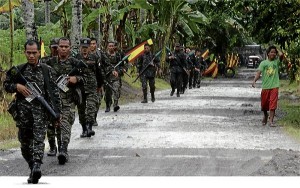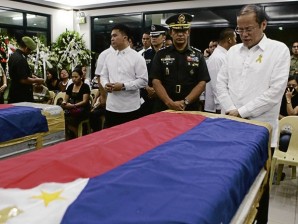Relentless appetite for war

MORO rebels patrol in their camp in the town of Sultan Kudarat in Maguindanao province. JEOFFREY MAITEM / INQUIRER MINDANAO
For those who share an interest in understanding violent conflicts, whether as students of war or as peace activists, the Philippines represents a paradigmatic case.
After all, this country is home to two of the longest-running violent conflicts in the world, a feat that may well yield a reference in an academic database or the Guinness Book of Records for that matter.
But, ultimately, it is nothing less than a tragedy for those condemned to living with and through these violent conflicts.
Conundrum
And yet, here is the conundrum. Just where the distant observer of the Philippines would expect, after nearly 40 years of violent conflict, a country weary of war, the opposite seems to be the case.
This became clear in the immediate aftermath of the clash on October 18 in Al-Barka, Basilan, which reportedly cost 25 lives – 19 soldiers and 6 fighters of the Moro Islamic Liberation Front (MILF).
Opinion-makers and a number of (ex-) politicians seized the moment and called for an all-out war against the MILF.
Cheerleaders
Against the backdrop of this country’s long experience with violent conflict, the cheerleaders of war conveyed an image best described as an insatiable appetite for war.
On display was that all too predictable mix of machismo, posturing, cheap talk and jumping to conclusions before the facts have been established.
The result – talking tough, ridiculing President Aquino, the government and its peace panel for their “soft” approach, and trotting out the worn-out yet persistent stereotypes about the Moro people.
Fallacy
It is a standard repertoire all over the world, but there is a real risk that beating the war drum will grant the delusional chimera of war as a viable solution another lease on life in the Philippines.
It is an absolute fallacy to think that by calling for an all-out war against the MILF, a lasting and just peace for the people of the Philippines can be realistically achieved.
Those that demand war should first ask themselves how the notion of achieving peace through war has played itself out on the broader canvass of the rest of the world. In other words, better to first heed the experiences from other times and places.
North Ireland’s lessons
The peace process of Northern Ireland, in particular, seems a pertinent example to learn from, for both war and peace advocates in the Philippines. Much in the same vein as the Mindanao conflict, the principal issues at stake were Northern Ireland’s constitutional status, as well as the need to find an appropriate power-sharing framework for Protestant and Catholic communities.
The relevance of Northern Ireland’s peace process for the Philippines became clear when the Rt. Hon. Paul Murphy, a British parliamentarian and former United Kingdom secretary of state for Northern Ireland and Wales, paid a visit to the Philippines last month.
The purpose of his visit was to talk with the government peace panel and its counterpart, as well as with military and police officials, leaders of civil society and business groups about his firsthand experiences with the peace process in Northern Ireland.
Peace table

PRESIDENT Benigno Aquino III pays his last respects at the Libingan ng mga Bayani to 15 of the 19 soldiers killed by Moro rebels. Benhur Arcayan / Malacañang Photo Bureau
According to Murphy, it was the mutual realization that they were stuck in a stalemate that drove the Irish Republican Army (IRA) and the British government, the main armed protagonists, to the peace table.
Due to superior military intelligence, the British army had gained a decisive tactical advantage over the IRA, severely limiting the capabilities of the IRA.
However, over time, the British army realized that its tactical advantage could not be converted into a decisive result at the strategic level. Thus, despite British military superiority, without a political settlement the low-intensity war in Northern Ireland could not be won at a cost acceptable to the British people.
High price
Northern Ireland’s long and arduous road to peace should serve as a poignant reminder of the lessons eventually learned by the British government at a high price: all-out war could never win durable peace for the people in Northern Ireland and Great Britain.
Northern Ireland represents a case in point, but it is by no means the only example that ought to give proponents of all-out war a long pause for thought. Although radically different in scale and nature, the Vietnam War offers a compelling lesson to those painfully ignorant about the problem-solving potential of an escalated war.
Tet Offensive
The 1968 Tet Offensive amounted to a military defeat for North Vietnamese forces, yet its real impact was that it finally began to dawn on the general public in the United States that the Vietnam War could simply not be won by excessive escalation, which included the My Lai massacre, the controversial use of chemical defoliation and indiscriminate bombing campaigns.
To be fair, the mistaken belief in war as an instrument for lasting peace and development features across the globe among sections of the political establishment. Consider, for instance, the tragic case of Afghanistan, an all-out war, which recently entered its 11th year.
Afghanistan
The Vietnam War may have generated a considerable cottage industry of hindsight, but fast-forward to Afghanistan today and one realizes that it was not enough to quench the same type of appetite for war that manifests itself again in the Philippines.
With regard to Afghanistan, war was expected to deliver the world from the evil of global terrorism and bring development to the country. The collective folly of military engagement in Afghanistan was also in large part a result of opinion leaders and politicians whipping the general public into a war frenzy.
Primordial sentiments infused with bloodlust, machismo and retribution took over from a hard-headed appraisal of history’s lessons about what war can realistically achieve in terms of peace and development.
Ten years on, a sense of realism is now beginning to emerge among diplomats and military commanders. What was unspeakable before—that without a meaningful political settlement the war in Afghanistan will be endless, hopeless and pointless – is becoming the new, albeit softly whispered, credo. Such a steep price to pay for an obvious truth! And a lesson with direct application to the Philippine context.
Disastrous consequences
Northern Ireland, Vietnam and Afghanistan – three very distinct experiences with violent conflict. Yet, these examples tell us something about the disastrous consequences of believing in all-out war as the road to peace. Difficult as it may be for the advocates of war against the MILF, there simply are no shortcuts to peace.
All-out war certainly is the least viable solution to address that complex web of factors underlying the conflict in Mindanao. The very least that can be done is to stay clear from the mistaken belief that war can build peace once and for all.
Only viable option
Rather, going for an all-out peace process remains the only viable option in the Philippines, which is by no means exhausted (take a closer look at the seemingly intractable conflict in Northern Ireland!)
After nearly four decades of violent conflict in the Philippines, it is time to start quenching the thirst for peace instead of giving in, yet again, to the seemingly insatiable appetite for war.
(Steven Schoofs is an independent research consultant working on peace and conflict issues. He currently lives in Manila and conducts research on the conflict in Mindanao.)
Human cost
150,000 estimated number of deaths in the Moro separatist war since 1970
40,000 estimated number of conflict-related deaths due to communist insurgency















